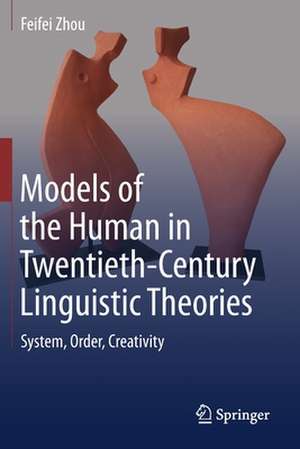Models of the Human in Twentieth-Century Linguistic Theories: System, Order, Creativity
Autor Feifei Zhouen Limba Engleză Paperback – 18 mar 2021
| Toate formatele și edițiile | Preț | Express |
|---|---|---|
| Paperback (1) | 638.11 lei 6-8 săpt. | |
| Springer Nature Singapore – 18 mar 2021 | 638.11 lei 6-8 săpt. | |
| Hardback (1) | 644.30 lei 6-8 săpt. | |
| Springer Nature Singapore – 18 mar 2020 | 644.30 lei 6-8 săpt. |
Preț: 638.11 lei
Preț vechi: 750.72 lei
-15% Nou
Puncte Express: 957
Preț estimativ în valută:
122.12€ • 127.02$ • 100.82£
122.12€ • 127.02$ • 100.82£
Carte tipărită la comandă
Livrare economică 15-29 aprilie
Preluare comenzi: 021 569.72.76
Specificații
ISBN-13: 9789811512575
ISBN-10: 9811512574
Ilustrații: XI, 233 p. 4 illus.
Dimensiuni: 155 x 235 mm
Greutate: 0.35 kg
Ediția:1st ed. 2020
Editura: Springer Nature Singapore
Colecția Springer
Locul publicării:Singapore, Singapore
ISBN-10: 9811512574
Ilustrații: XI, 233 p. 4 illus.
Dimensiuni: 155 x 235 mm
Greutate: 0.35 kg
Ediția:1st ed. 2020
Editura: Springer Nature Singapore
Colecția Springer
Locul publicării:Singapore, Singapore
Cuprins
Chapter 1. Introduction.- Part I: System and the Individual Speaker.- Chapter 2. Sassure: Langue as an autonomous system.- Chapter 3. Bloomfield: A grammar system.- Chapter 4. Chomsky: System and the ideal speaker-hearer.- Chapter 5. Labov: Systemic variation and knowledge.- Chapter 6. Bucholtz and Hall: System and identity.- Chapter 7. Haugen, Mulhausler and Mufwene: System and language ecology.- Chapter 7. Conclusion to Section I.- Part II: Social Order.- Chapter 9. From Durkheim to Garfinkel: Social facts and social order.- Chapter 10. Garfinkel: Members' methods of producing order.- Chapter 11. Case Study.- Chapter 12. Sacks, Schegloff and Jefferson: Order in conversation.- Chapter 13. Social order, rationality and modernity.- Chapter 14. Pragmatics: Order in speech acts.- Chapter 15. Comparison of conversation analysis and speech act theory.- Chapter 16. Conclusion to Section II.- Part III: Creativity.- Chapter 17. Creativity, linguistics, the Skinner-Chomsky controversy.- Chapter 18. Comparing Chomsky, Skinner and Harris: How are human roles conceptualized.- Chapter 19 .Comparing Chomsky, Skinner and Harris: Thoughts on politics and human nature.- Chapter 20. Comparing Chomsky, Skinner and Harris: Thoughts on politics and human nature.- Chapter 21. Alternative theories: Creativity, metaphor, and everyday conversation.- Chapter 22. Creativity, machines and posthumanism.- Chapter 23. Conclusion to Section III.- Chapter 24. Conclusion.
Notă biografică
Dr. Feifei Zhou is an Assistant Professor at the Department of English, Lingnan University, Hong Kong, where she teaches Sociolinguistics and Psycholinguistics. In 2014, Zhou received her Ph.D. in Linguistics and the History of Ideas from the University of Hong Kong. Her research interests include the history of linguistics, health discourses, and linguistic landscapes.
Textul de pe ultima copertă
This book provides a refreshingly new perspective for investigating linguistic texts, which foregrounds models of the human. It presents a close reading of major linguistic theories in the twentieth century with a focus on three main themes: linguistic system and the individual speaker; social order; and linguistic creativity. The examination of these three fundamental themes concerning language and human nature, on the one hand, provides a fine-textured exposition on the implicit and explicit models of human nature endorsed by major theorists; on the other, it reveals the methodological dilemmas faced by linguistics. In light of the fact that the importance of considering posthumanist ideas is increasingly being underscored today, both within and outside linguistics, this focus on the human makes the book highly topical.
Caracteristici
Offers a wholly new perspective for investigating linguistic texts using three themes that are fundamental to discussions of the human Highlights the inherent tension in linguistic theorizing, based on a close reading and elucidation of a wide range of major linguistic texts Includes in-depth discussions on posthumanism, machines and language by incorporating insights from philosophy, the information sciences, cognitive sciences, and artificial intelligence
